Mary Sue Wilkinson remembers how sad she felt when she used to visit her father-in-law who was suffering from dementia. He was a former minister, but near the end of his life he couldn’t talk.
Whether out of desperation or instinct, Mary Sue took her guitar and started to sing the old Gospel hymn, I’ll Fly Away. He made eye contact and began to sing along.
"He sang every word in perfect harmony; perfect pitch," says Mary Sue. "He was so happy you could just see that he was experiencing the competence of that.”
She didn’t understand what was happening, but knew she made a connection with her father-in-law that day. Mary Sue kept playing and singing the old hymns and soon other residents where he lived wanted in on the singing.
Mary Sue’s father-in-law passed away in 2010, but that music experience helped her realize one of her passions.
Now, she runs Young at Heart Music. It’s a sing along music program for seniors. She leads about 400 different music sessions a year. On Wednesday mornings, she visits Orchard Creek Supportive Care in Traverse City and plays an hour of live music.
Mary Sue Wilkinson has been playing the guitar since she was 12. And she still sings with her Americana duo called Drive South. But she’s careful not to use the term performance when she’s singing and playing for seniors. She says her goal is to engage them, not perform for them.

“One of the primary benefits I see with music— for all of us really, but especially for people who are experiencing memory loss, is the ability for it to connect us," Mary Sue says.
Beyond the connection, she says music also awakens memories in these seniors and brings joy and and happiness into their lives.
According to the Mayo Clinic, dementia isn’t a specific brain disease. It’s a group of symptoms that kills brain cells and affects memory, thinking and social abilities.
Normal, everyday things like conversation and remembering someone’s name require literal analysis from the brain.
Musical experiences on the other hand, do not. They’re more automatic, almost hardwired into the brain.
That’s why people can often remember songs from formative years or songs associated with certain memories or emotions, even when other parts of the brain are severely damaged by disease.
Suzanne Hanser is the chair of the music therapy department at Berklee College of Music. She says the brainstem processes the body’s rhythms— things like our circulation, our gait and the music that we hear.
“So even when an entire brain is damaged in some way or neurologically affected by disease, we still have this rhythmic sense," Hanser says. "And music that is time ordered, music that continues in time…its ongoing nature allows it to be processed.”
June Harmsen has been the administrator of Orchard Creek Supportive Care for the past 9 years. She jokes that sometimes, she gets accused of being a "walking musical." She says the care center tries to incorporate music into everything they do with the residents— even when walking with them in the hallways, or bathing them.
June says Mary Sue Wilkinson singing with the residents every week, reinforces that entire approach.
"They’re not here to be warehoused, they’re here to live," she explains. "And so by introducing them to music and keeping music as part of our culture, it allows them to continue to build their earth, return to their memories, and use those memories in ways that help them and help us.”
Furthering that quality of life is the reason what makes Mary Sue Wilkinson feel so happy sharing her gift of music with others.
“And people always tell me, ‘Oh, thank you for doing this,’" Mary Sue says. "I get back at least two fold for what I give out with music.”
Mary Sue Wilkinson recently authored a new book about music and dementia care.
Songs You Know By Heart: A Simple Guide for Using Music in Dementia Care includes a CD with 18 sing along songs recorded by Mary Sue herself.
You can also purchase the book at Horizon Books, in Traverse City.


